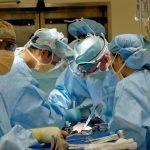-
Colorectal Surgery to Remove Hemorrhoids: 10 Must-Knows
Uncover the top-notch colorectal surgery options at the hospital for bid farewell to pesky hemorrhoids. Discover effective treatment procedures, recovery tips, and what to expect post-surgery. Delve into a world where relief meets expertise in treating this common ailment. Dive deeper into surgical treatment tailored to tackle hemorrhoids head-on with precision and care.

Scroll down for reviews of our top picks!
1. Understanding the Types of Hemorrhoid Surgery
Hemorrhoidectomy is a surgical treatment that involves the removal of hemorrhoids, providing a long-term solution for patients with severe cases. This method is effective in treating both internal and external hemorrhoids by excising the swollen blood vessels.
Rubber band ligation, a non-surgical treatment, works by cutting off blood flow to the hemorrhoids using tight rubber bands. It is less invasive than surgery and can be performed in an outpatient setting with minimal pain and recovery time.
Stapled hemorrhoidopexy utilizes staples to reposition and secure the hemorrhoidal tissue back into its original position within the anal canal. This technique typically results in less postoperative pain compared to traditional surgery methods like hemorrhoidectomy.
Each type of treatment has its own set of benefits and considerations based on the severity of the condition and individual patient factors. Consulting with a healthcare provider specialized in colorectal surgery can help determine which approach is most suitable for each case.
2. Pre-Surgery Dietary Adjustments
Increasing fiber intake is crucial before colorectal surgery to soften stools and prevent constipation, aiding in a smoother recovery process. Fiber-rich foods like fruits, vegetables, and whole grains can help regulate bowel movements.
Staying hydrated by drinking plenty of water is essential as it promotes regular bowel movements and prevents dehydration. Water also aids in softening the stool, making it easier to pass without straining and reducing the risk of hemorrhoids.
Avoiding foods that can cause gas or bloating, such as beans and carbonated drinks, is advisable prior to surgery. Gas build-up can lead to discomfort post-surgery due to increased pressure on the rectal area and hemorrhoids.
By making these dietary adjustments pre-hemorrhoid surgery, patients are likely to experience less strain during bowel movements after the procedure. The Western diet often lacks sufficient fiber content; hence, consciously incorporating high-fiber foods into one’s diet becomes even more critical before surgical intervention for hemorrhoids.
Adhering strictly to these dietary recommendations not only prepares the body for surgery but also minimizes potential complications during the recovery phase when blood vessels around the rectum, which are healing from the surgical procedure, are affected by hemorrhoids.
3. The Importance of a Bowel Prep
Bowel prep before colorectal surgery to remove hemorrhoids is crucial for a successful procedure and recovery:
-
Reduced Infection Risk: Cleansing the colon through bowel prep lowers the chances of infection during and after surgery.
-
Laxatives and Diet: Typically, patients are instructed to take laxatives and adhere to a specific diet for one or two days pre-surgery.
-
Strict Adherence: Following bowel prep instructions diligently is essential for optimal cleansing results.
Ensuring your bowels are adequately prepared can significantly impact the outcome of your hemorrhoid removal surgery.
4. Risks and Complications of Hemorrhoid Surgery
Bleeding during or after surgery is a potential risk. This can happen due to the nature of the procedure involving delicate tissues, hemorrhoids.
Infection at the surgical site can occur, although it is rare. Proper post-operative care and hygiene significantly reduce this risk.
There is a small chance of developing anal stenosis or hemorrhoids, where the anal opening becomes narrowed. This condition, such as hemorrhoids, might require further treatment if it occurs post-surgery.
These risks are important to consider when opting for hemorrhoid surgery as they highlight potential complications that could arise during or after the procedure.

5. Post-Surgery Pain Management Strategies
Post-colorectal surgery, managing pain effectively is crucial for a smooth recovery process. Here are some strategies to help alleviate discomfort:
-
Utilize over-the-counter pain relievers like acetaminophen to ease post-surgery pain.
-
Applying ice packs to the surgical site can significantly reduce swelling and discomfort, providing relief.
-
In cases where standard pain management methods may not suffice, your healthcare provider might prescribe stronger pain medications tailored to your needs.
Effective post-operative pain management plays a vital role in ensuring patient comfort and promoting healing after colorectal surgery. By following these strategies under the guidance of your healthcare team, you can enhance your recovery experience and minimize any unnecessary discomfort or complications during this critical phase.
6. Recovery Time and What to Expect
Recovery after colorectal surgery for hemorrhoids typically spans one to three weeks, varying based on the specific procedure undergone. During this time, it is common to experience mild discomfort and bleeding that can persist for several days post-hemorrhoid surgery. Individuals may encounter challenges with bowel movements and hemorrhoids as part of the healing process.
It’s essential to understand that recovery rates can differ from person to person due to factors such as overall health, adherence to post-operative care instructions, and the type of surgical intervention performed. While some patients may recover more quickly with minimal symptoms, others might require a longer healing period with more pronounced side effects.
Throughout the recovery phase, maintaining open communication with healthcare providers is crucial in addressing any concerns or unexpected symptoms, including hemorrhoids, promptly. Patients should follow prescribed medication regimens diligently and adhere strictly to dietary recommendations aimed at promoting healing and preventing complications.
7. Lifestyle Changes to Prevent Recurrence
Eating a high-fiber diet is crucial in preventing constipation, a common trigger for hemorrhoids. Fiber adds bulk to the stool, making it easier to pass and reducing the strain on the rectal veins.
Staying physically active aids in maintaining bowel regularity by promoting healthy digestion and preventing constipation. Simple activities like walking or cycling can make a significant difference.
Avoiding straining during bowel movements is essential as it puts excessive pressure on the rectal area, leading to the development or recurrence of hemorrhoids. Taking your time and not rushing through bathroom visits can help alleviate hemorrhoids.
Incorporating lifestyle changes such as these into your daily routine can significantly reduce the risk of recurrent hemorrhoids without relying solely on medication or surgical interventions. By proactively managing your diet, exercise habits, and bathroom practices, you can maintain optimal colorectal health and minimize discomfort associated with hemorrhoidal issues.
8. The Role of Follow-Up Appointments
Follow-up appointments after colorectal surgery to remove hemorrhoids play a crucial role in your recovery journey. These appointments allow your doctor to closely monitor how well you are healing and if any further intervention is needed.
Attending these follow-up appointments is essential as your doctor will conduct physical examinations to ensure that you are recovering properly post-operation. By following through with these visits, any concerns or hemorrhoids complications can be promptly addressed, leading to better outcomes in the long run.
These check-ups provide an opportunity for you to receive valuable information on managing your recovery effectively. Your healthcare provider may offer guidance on medication management, wound care, and other aspects crucial for a successful healing process.
Ensuring that you keep up with your scheduled follow-up appointments not only aids in tracking the success of the operation but also helps in addressing any issues early on, ultimately contributing to a smoother recovery experience.
9. When to Contact Your Doctor Post-Surgery
If you experience severe pain post-surgery that does not subside with medication, it is crucial to reach out to your doctor promptly. Any signs of excessive bleeding or symptoms of infection like fever or pus should be reported without delay.
Changes in bowel habits after the surgery or the emergence of new symptoms should not be ignored. Keeping your healthcare provider informed about any persistent issues ensures timely intervention and appropriate management.
Remember, your doctor is there to support you throughout your recovery journey. Don’t hesitate to contact them if you have any concerns regarding your healing process or if something feels off.
10. Insurance and Cost Considerations
Understanding your insurance coverage for hemorrhoid surgery is crucial. Costs can vary significantly based on the type of surgery you need and where you are located. To avoid unexpected bills, it’s essential to check with your insurance provider beforehand.
Discussing payment options with your healthcare provider is also vital. They can provide information on potential financial assistance programs that may help alleviate the financial burden associated with colorectal surgeries for hemorrhoids.
Closing Thoughts
You’ve now got the lowdown on hemorrhoid surgery – from understanding the different types to what you can expect post-op. Remember, prep is key, so stick to those dietary adjustments and follow your doctor’s advice for a smooth recovery. Don’t forget about those lifestyle changes to keep things in check long-term. And hey, if you’re worried about costs, chat with your insurance provider.
So, armed with this info, go forth and conquer that hemorrhoid surgery like a pro! Your health is in your hands, so take charge and bounce back stronger than ever.
Frequently Asked Questions
Can I prevent hemorrhoid surgery through lifestyle changes?
Yes, adopting a high-fiber diet, staying hydrated, avoiding straining during bowel movements, and regular exercise can help prevent the development or worsening of hemorrhoids.

How long does it typically take to recover from hemorrhoid surgery?
Recovery time varies but usually ranges from 1 to 3 weeks. Following post-operative care instructions diligently and attending follow-up appointments are crucial for a smooth recovery process.
Are there any non-surgical alternatives to treat hemorrhoids?
Yes, non-surgical treatments like dietary modifications, topical creams, sitz baths, and rubber band ligation can be effective in managing mild cases of hemorrhoids before considering surgery.
What are the common risks associated with hemorrhoid surgery?
Potential risks include bleeding, infection, anal fissures or strictures (narrowing), urinary retention, and recurrence of hemorrhoids. It’s essential to discuss these risks with your healthcare provider before opting for surgery.
Will insurance cover the cost of colorectal surgery for removing hemorrhoidal columns?
Insurance coverage varies based on factors like your policy terms and medical necessity. Contact your insurance provider beforehand to understand what costs will be covered and if any pre-authorization is required for the procedure.
